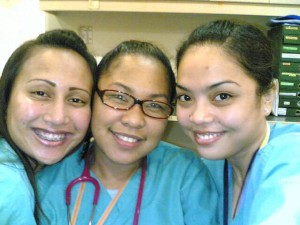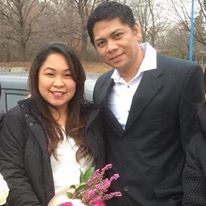A nurse’s trail from Singapore to Canada
Ivy Privado-Gonzales arrived in Toronto, Ontario, Canada, in the spring of 2013. The weather was fine. It was a nice day to walk around the parks, feed the geese or simply stare at the flowers in full bloom. But Ivy needed to find work. Instead of strolling she went to hospitals, home cares and clinics waiting for interviews.
After working as a nurse at Tan Tock Seng Hospital in Singapore for five years, Ivy tried her luck in Canada after attending a seminar about immigrating there.
“Through the seminar I learned all the ‘good’ things and benefits. So I processed my application immediately. After three months, my application was processed. My visa was approved in October 2012,” Ivy recalls.
She would find out that hardships came along with the good things.
Singapore to Canada
Ivy is no stranger to hardship. She had worked at the oncology unit of the second largest hospital in Singapore that served cancer patients undergoing chemotherapy. Ivy recalls that the elderly patients in Singapore were very demanding because they had paid much but did not realize that most of the money did not go to the nurses. Discrimination of Filipino workers also prompted her to quit.
“We worked hard in Singapore, often one to two hours overtime without pay. In Canada we get paid even for 15 or 30 minutes extra hour,” Ivy says.
In Canada Ivy worked different jobs, from attendant at a coffee kiosk where she lasted only two days, to personal support worker and therapist. From Toronto, she went to Vancouver to find a job but came up empty-handed. So she went back to Toronto and lived with her cousins.
“My first employer forced me to work even on my day-off. I was new to the place and I had to provide home care services. It was a struggle finding my client’s place,” she relates.
After two months, she quit. Ivy was sick for two weeks. Despite that, she never thought of giving up. She found work as a physiological assistant but only for 10 to 12 hours a week. She kept on looking until she found a high-paying job at 20 to 30 hours a week. It allowed her only five hours of sleep a day.
Eventually, she left her cousin’s place and found her own place, at a staggering $500 a month. She also once unwittingly shared a flat with a woman who was suffering a mental breakdown.
Nursing practice in Canada
Upon arrival in Canada, foreign nurses who want to work must apply at the Canadian Nursing Organization (CAN) for the assessment of credentials. The applicant must wait for the decision of CNA whether the applicant is qualified to take the exam or needs more schooling.
The nursing profession in Canada and the United States commands higher pay compared with Philippines. A nurse in North America does the initial assessments and manages a patient first before he/she goes to the doctor for diagnosis or treatment.
Ivy passed the nursing examination and finally got a license as an RPN or registered practical nurse. Since she already passed the NCLEX exam, Ivy would only need 20 months of schooling to become a registered nurse (RN)
Ivy works 12 hours a day at Bayshore Home Health Care Services and Carefirst Senior Care Transition Unit. She divides her time to work in both places depending on her availability. At Carefirst, the hours depend on the number of patients. She usually has one day off.
“Discrimination in Canada is discreet because there is an anti-discrimination law where we can file a complaint if we feel discriminated. But it is there,” Ivy says.
Work distribution can become unfair once the employer knows that a worker is already a licensed nurse. “It’s like you feel the employer trusts you, when in fact, your responsibilities just increased,” Ivy says.
Waiting for citizenship
Ivy was married to a Filipino immigrant, Manny Gonzales, in 2015. The family now lives in Mississauga. In June 2016, she gave birth and has been on maternity leave since. Her maternity leave ends in May 2017. As a permanent resident she is eligible for benefits even if she works on a part-time basis.
If a mother has 55-60 percent taxable earning, she will receive a check depending on the amount of her income prior to delivery, aside from the childcare allowance until the child reaches 18 years of age. Single mothers receive more childcare allowance.
“My son Liam is a citizen by birth. My husband is just waiting for his oath-taking notice while I will apply for citizenship in April,” Ivy says.
Ivy realizes that the immigration of nurse could create a vacuum in the healthcare system of the Philippines. She believes that the Philippine Nursing Association should strongly lobby for the increase of the salaries and benefits of nurses in both private and government sectors.
“Even abroad or whenever we go back home we can help and share our learning experiences with fellow nurses, friends and former clinical instructors and professors to enhance nursing and the nursing delivery system. We should keep strong ties with fellow nurses,” Ivy advises.




